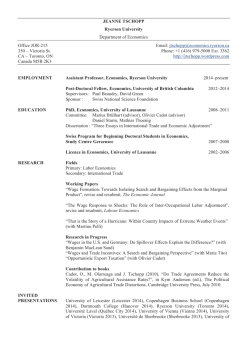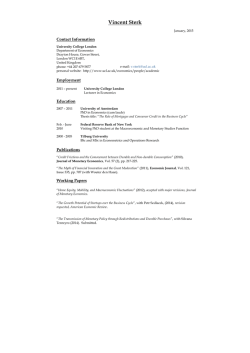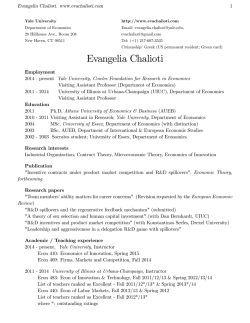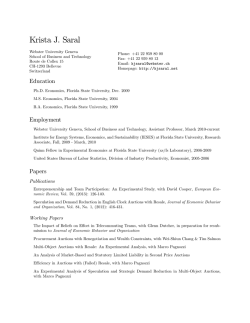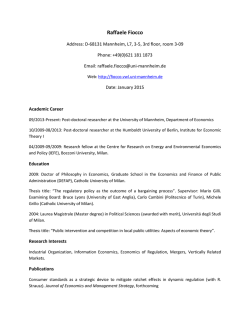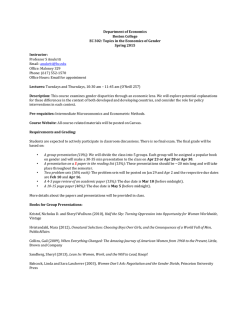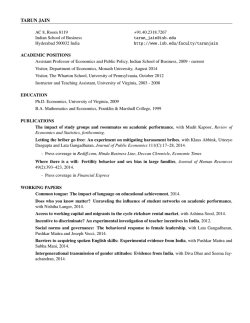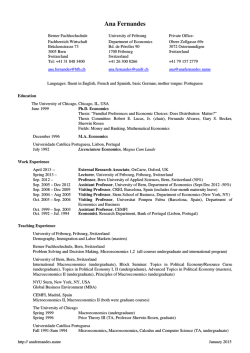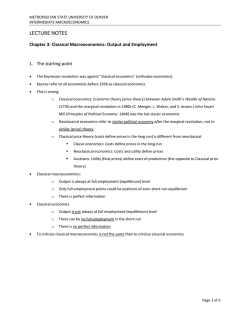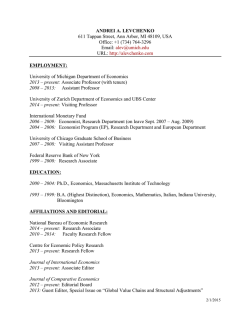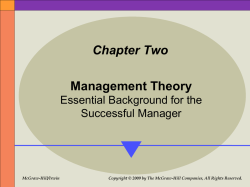
Behavioral economics Ec 101 Colin Camerer, Caltech
Behavioral economics: Introduction Colin Camerer, Caltech RES Easter School 22-25 Mar 2015 • What is it? •Use facts about natural [biological] limits on computation, willpower and self-interest to improve economics •History: •Why was psychology ignored? • Questions to eventually answer –What happens in equilibrium? –Welfare and policy This deck is for personal scholarly use only. Do not quote, circulate, or use for teaching. Precursor: What is economics? • Consumer theory – Maximize utility given preferences and information, subject to constraint Max u(x1,x2,…xn|θ) s.t. Σi pixi <y (income) • Demand – From consumer theory – Complicated by risk, time, probability judgment (given θ) – Assume social independence of demand (no “fashion”) • Supply – Firms combine capital and hired labor to produce output – Sorting of different workers into ideal jobs (Becker: “That takes care of 90% of it”) Allowing imperfection always improves economics Perfect competition (∞ firms) Useful special case, helpful to relax (product differentiation, oligopoly) Perfect information (θ = truth) Useful special case, helpful to relax (costly hidden information & action, signaling) Perfect rationality (max u(x)) Useful special case, helpful to relax (costly information processing, heterogeneity) What do economists study? AER March 07 • The Missing Motivation in Macroeconomics George A. Akerlof Competence Implies Credibility Giuseppe Moscarini Modeling the Transition to a New Economy: Lessons from Two Technological Revolutions Andrew Atkeson and Patrick J. Kehoe The Cross Section of Foreign Currency Risk Premia and Consumption Growth Risk Hanno Lustig and Adrien Verdelhan Inefficiency in Legislative Policymaking: A Dynamic Analysis Marco Battaglini and Stephen Coate Decision Making in Committees: Transparency, Reputation, and Voting Rules Gilat Levy Bureaucrats or Politicians? Part I: A Single Policy Task Alberto Alesina and Guido Tabellini The Motivation and Bias of Bureaucrats Canice Prendergast Urban Evolutions: The Fast, the Slow, and the Still Gilles Duranton Market Share Dynamics and the "Persistence of Leadership" Debate John Sutton • Internet Advertising and the Generalized Second-Price Auction: Selling Billions of Dollars Worth of Keywords Benjamin Edelman, Michael Ostrovsky and Michael Schwarz Credible Sales Mechanisms and Intermediaries David McAdams and Michael Schwarz Imprecision as an Account of the Preference Reversal Phenomenon David J. Butler and Graham C. Loomes Do Workers Work More if Wages Are High? Evidence from a Randomized Field Experiment Ernst Fehr and Lorenz Goette The Effect of Court-Ordered Hiring Quotas on the Composition and Quality of Police Justin McCrary The Economic Impacts of Climate Change: Evidence from Agricultural Output and Random Fluctuations in Weather Olivier Deschênes and Michael Greenstone What Are Stock Investors’ Actual Historical Returns? Evidence from Dollar-Weighted Returns Ilia D. Dichev What model features are useful? • Neoclassical economics: – Generality– applies to many domains – Precision– produces clear predictions – Accuracy– predictions are tested by field data • Behavioral economics: – All of above + psychological plausibility– fit data on how individuals think, perceive etc. Why psychology was ignored: Milton Friedman, Methodology of Positive Economics (1953) • “The abstract methodological issues we have been discussing have a direct bearing on the perennial criticism of “orthodox” economic theory as “unrealistic” as well as on the attempts that have been made to reformulate theory to meet this charge. Economics is a “dismal” science because it assumes man to be selfish and money-grubbing, “a lightning calculator of pleasures and pains, who oscillates like a homogeneous globule of desire of happiness under the impulse of stimuli that shift him about the area, but leave him intact”; it rests on outmoded psychology and must be reconstructed in line with each new development in psychology;…” Forgotten passage… • “As we have seen, criticism of this type [about accuracy of assumptions] is largely beside the point unless supplemented by evidence that a hypothesis differing in one or another of these respects from the theory being criticised yields better predictions for as wide a range of phenomena. (mytalics)” • That is precisely what behavioral economics tries to do… precisely precisely Claim: Many important economic decisions will not necessarily be‘computed’ correctly • • • • • • Housing Marriage/divorce Children Education & career choices Violence (crime, war) Health Claim: Many important economic decisions will not necessarily be‘computed’ correctly • Why not? – Many are political decisions (median voter theorem) – Evolution did not face these challenges – Learning from experience is difficult – Advice markets may or may not work well – Imitation of successful people may or may not work well Examples • Computation – Chess, consumer choice • Willpower – Hyperbolic discounting • Greed – Ultimatum games Do markets correct mistakes? • Tug-of-war: – Firms sort to limit rationality mistakes from workers…and to better exploit consumer mistakes – Example: Pathological gambling GAMBLING PROBLEMS - TOP RATED ONLINE CASINO SITES. FREE KENO MASSAGE SANDALS BONUS ... is licensed and gambling problems regulated ! Here you will find gambling problems more information about all ... www.casino-startup.com/gambling-problems.html - 17k - Cached - More from this site - Save - Block Heterogeneity in economics • Not everyone is the same – Differences create division of labor, specialization – Interactions are interesting: Is the effect of limitedly-rational agents multiplied or erased? (Fehr Camerer Sci 07) • Individual differences • Gender, lifecycle, IQ, patience • Example: Aging and credit (Laibson et al 07) Pareto believed optimization was due to learning… • [W]e are concerned only with certain relations between objective facts and subjective facts, principally the tastes of men. Moreover, we will simplify the problem still more by assuming that the subjective fact conforms perfectly to the objective fact. This can be done because we will consider only repeated actions to be a basis for claiming that there is a logical connection uniting such actions. • A man who buys a certain food for the first time may buy more of it than is necessary to satisfy his tastes, price taken into account. But in a second purchase he will correct his error, in part at least, and thus, little by little, will end up by procuring exactly what he needs. We will examine this action at the time when he has reached this state. History and sociology • Herbert Simon – 1954 JASA/OR/Econometrica/PoliSci – “bounded”, “procedural” rationality (a/k/a Aumann “rule rationality) – Inspired by cognitive revolution in psych, AI • Thaler 1980 “Toward a theory of consumer choice” (JEBO, first article, first issue) – Met Kahneman, Tversky in 1970’s • KT, Slovic, Fischhoff, Lichtenstein – Used deviations from Bayesian judgment, EU to understand psychological principles – Analogy to visual illusions in study of perception Optical illusions: Decomposition is unnatural…except for autists! Modern history … • Second wave empirics & psychology – Camerer, Loewenstein, Shafir, Shefrin (c. 1985+), Shiller (1981) • Third wave formalists – Rabin (1993 AER), Laibson (1997 QJE) • Koszegi, O’Donoghue • Empirics: Malmendier, Della Vigna, D. Silverman et al, +++ • Nobel prize (Kahneman-Smith 02) – Thaler: “Did you ever think we would be here?” CFC: ______ • Converts – Benabou-Tirole (03?), Fudenberg-Levine (06), Benhabib-Bisin (05), many more… • 2005+ Fundamentalist backlash – Shaked “pamphlet” on social prefs, Rubinstein, Gul and Pesendorfer (05) (echo of Pareto-Friedman argument), Levine (“Is behavioral economics doomed?”) – Relatively easy to publish ‘ refutations’ of behavioral economics findings (Plott-Zeiler AER, Manaiadis AEJ, AER, Sprenger AER…) Trends: Franchising • Finance (Shiller-Thaler, Shleifer, Barberis, Odean) – Rationality limits influence pricing, corporate • Game theory (Crawford, Camerer…) – Formal models of cognitive hierarchy, learning • Labor (Fehr…) – Reciprocity/crowding out overturns many conclusions • Law (Sunstein) – Influence of framing, norms, tackle paternalism • Public finance (Slemrod et al ) – What is welfare? • Poverty (Shafir, Mullainathan) Trends: Formal theory & field data • ‘New’ psychology & sociology – Attention, motivated cognition, self-image, social networks + peer effects • Formal theory – Deriving bounds on rationality from familiar primitives (beliefs, preferences, rational attention) – Dual-process models (planner-doer, controlledauto…) – My view: Theories that fit the most data and make sharp, bold predictions are preferred • Field data – Friedman’s desideratum– what new effects are predicted & explained? Conclusions • Behavioral economics is now well-established – Should cease to be a distinct subfield around 2015 • Grounds economics in psychology and biology • Imperfect rationality is as natural as – Imperfect competition – Imperfect information • Interesting questions about market equilibrium • Controversies are healthy (normal science) – E.g. reference points are fragile • Frontiers: – Field data, careful theory, “new” psychology… Some critique • “The conclusion of so-called behavioral economics is that people don’t behave in a rational way, that they don’t respond as expected to economic incentives. Empirical economics shows that people do respond very precisely to economic incentives.” (Robert Aumann interview 9/04 http://www.ma.huji.ac.il/~hart/papers/mdaumann.pdf?. ) • Not quite: People respond imprecisely (perhaps slowly) to incentives. And they respond to variables which are not incentives (not prices, income, or information) Conscious computation and “as if” • “The thesis that behavioral economics attacks is that people behave rationally in a conscious way—that they consciously calculate and make an optimal decision based, in each case, on rational calculations. [Ed. : False] Perhaps behavioral economists are right that that is not so. Because their experiments or polls show that people, when faced with certain kinds of decisions, do not make the rational decision. However, nobody ever claimed that; they are attacking a straw man, a dead horse. What is claimed is that economic agents behave in a way that could be described as derived from rationality considerations; not that they actually are derived that way, that they actually go through a process of optimization each time they make a decision.” (Aumann interview) • Not so: We are questioning predictions of the “as if” view and attempting to construct models which make better predictions. Read Friedman carefully...
© Copyright 2026
